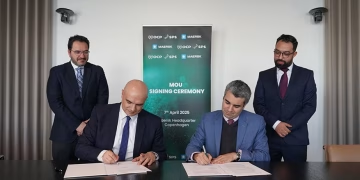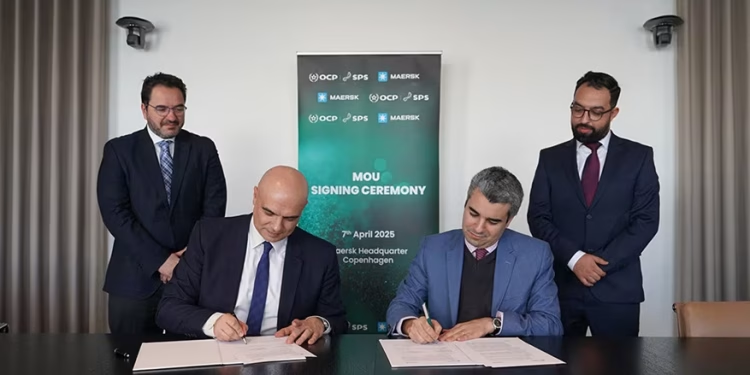By Eva Richardson | The Logistic News
April 14, 2025
In a move that could transform Africa–Europe maritime logistics, OCP Group, Morocco’s global phosphate leader, has signed a landmark strategic cooperation agreement with Danish shipping giant Maersk. The deal, finalized on April 7, 2025, aims to establish a new generation of supply chains built on resilience, sustainability, and regional value creation.
The agreement primarily focuses on developing supply chain infrastructure that enhances trade connectivity and meets the environmental and operational challenges of the coming decade.
“This partnership marks a shift in how we build and operate trade networks,” said an OCP spokesperson. “Together with Maersk, we’re constructing more than logistics—we’re enabling a green, scalable model for cross-continental collaboration.”
Building a Sustainable Backbone
Both companies have outlined a shared vision focused on reducing carbon emissions, accelerating digital transparency, and developing local workforce expertise. A core pillar of the agreement is the gradual replacement of high-emission transport methods with low-carbon and renewable energy-powered alternatives.
OCP, which exports to over 160 countries, is also responding to tightening environmental regulations in Europe by embedding sustainability at every level of its export logistics strategy.
For Maersk, the partnership aligns with its long-term target of reaching net-zero emissions by 2040—a goal that will require broad alliances and strategic access to emerging green hubs like Morocco.
Casablanca and Tanger Med: Ports of the Future
The collaboration includes targeted investments at Casablanca and Tanger Med, two of Morocco’s most sophisticated port platforms. Enhancements will prioritize multimodal integration, container flow optimization, and last-mile efficiency, setting a new standard for North–South trade infrastructure.
By improving operational fluidity, the agreement is expected to open faster, more reliable routes between Africa and Europe, supporting both bulk commodities and diversified manufactured exports.
Human Capital at the Center
The partnership goes beyond physical assets. Moroccan professionals receive substantial training in next-generation logistics, which encompasses everything from digital freight solutions to green transport systems.
Rather than outsourcing expertise, Maersk and OCP are choosing to invest in local capacity, ensuring that sustainability isn’t just imported—it’s built from within.
“It’s not just about moving goods. It’s about moving forward—together with the people who will lead tomorrow’s logistics,” noted a source close to the initiative.
Morocco’s Transition from Resource to Regional Anchor
Historically seen as a resource exporter, Morocco is now positioning itself as a strategic logistics gateway, bridging Europe, West Africa, and the MENA region. The OCP–Maersk alliance is a strong signal that major logistics players see the kingdom as more than a waypoint—they see it as a platform for innovation and impact.
With global freight shifting toward cleaner, smarter, and more connected systems, this agreement could serve as a blueprint for green corridors worldwide.
Eva Richardson is a senior correspondent for The Logistic News, reporting on global trade alliances, sustainable freight networks, and maritime infrastructure innovation.























